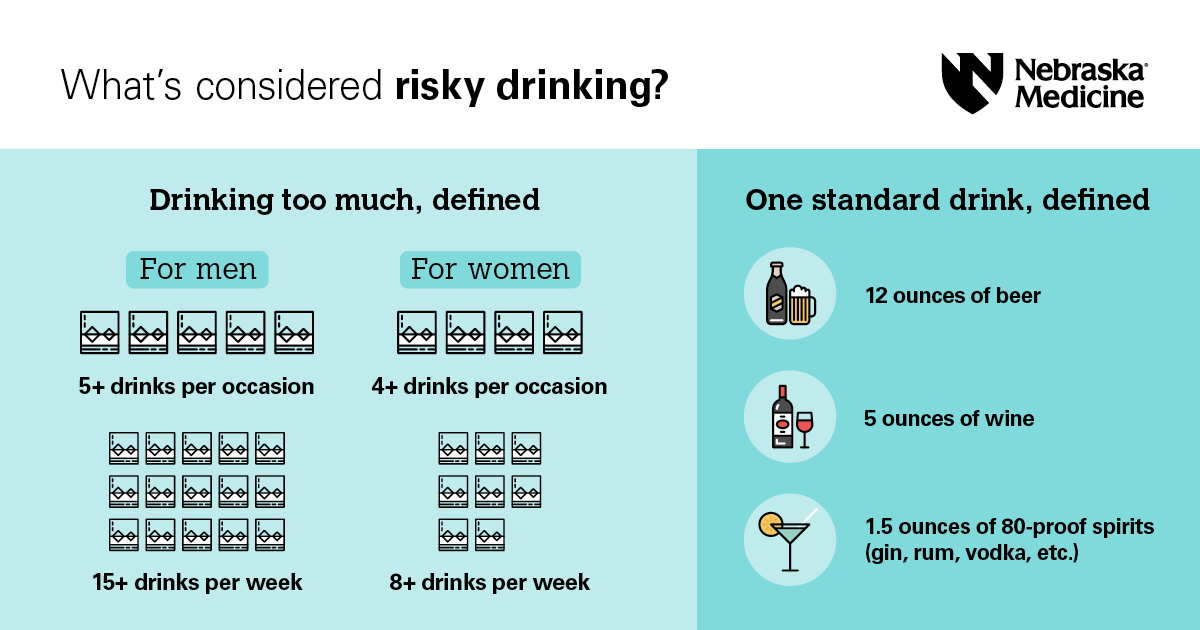Don't let risky drinking ruin your holiday

For many of us, drinking is an expected part of holidays and social gatherings. However, overindulging on these occasions can lead to risky drinking behaviors that harm your health and safety.
Risky drinking isn't a problem for everyone. Some people can moderate their alcohol use just fine. They can enjoy a glass of wine (or two) without further temptation.
But many of us struggle with knowing how much alcohol is too much. Here, board-certified addictionologist Kenneth Zoucha, MD, explains the definition of risky drinking and why women have lower limits. Dr. Zoucha cares for people with substance use disorders.
Why are alcohol limits higher for men?
Men and women process alcohol differently. A man and a woman drinking two identical alcoholic beverages will not have the same reactions.
Dr. Zoucha explains alcohol's stronger effect on women.
"Biological differences in chemistry and body structure lead most women to absorb more alcohol than men," explains Dr. Zoucha. "Women also take longer to metabolize alcohol. As a result, after drinking the same amount of alcohol, women tend to have higher blood alcohol levels than men. As such, the immediate effects of alcohol usually occur more quickly and last longer in women than men."
How alcohol affects long-term health
Long-term health problems, like brain changes, heart issues and liver damage, can also start sooner in women than men. Potential health problems include:
- Brain: "Cognitive decline associated with alcohol use develops more quickly in women," says Dr. Zoucha.
- Mood: Alcohol use can make mental illnesses, like anxiety and depression, worse.
- Heart: Excessive drinking can cause disease and injury to the heart. "Women are at increased risk because the damage occurs at lower levels of drinking and over fewer years," says Dr. Zoucha.
- Gut: Regular drinking can cause alcoholic gastritis, which includes symptoms like stomachache, hiccups, indigestion, loss of appetite, bloating and nausea.
- Liver: Excessive alcohol use can cause cirrhosis, the most advanced form of alcoholic liver disease.
How to enjoy alcohol in moderation
- Pace your drinking. One alcoholic drink every hour is a good pace, especially if you follow each alcoholic drink with a glass of water.
- Don't drink on an empty stomach. Alcohol affects you more if you haven't eaten anything. Nibble on some snacks, or better yet, an entrée, to help your body process the booze.
- Avoid unknown alcoholic content. It's difficult or impossible to determine just how much alcohol is present in punch, cocktails and other mixed drinks. Stick to labeled drinks like bottles, cans or mixed drinks that you make yourself or are made while watching.
Struggling with addiction? Tips on staying sober
- Replace alcoholic drinks with booze-free alternatives. Sparkling water, soda, tea and juice are better for your mind and body than alcohol. You can also find nonalcoholic beer and spirits online.
- Skip risky parties. If an event is hosted at a bar, or you know there will be heavy drinking at a party, you can opt to do something else. You might go ice skating or see a movie instead.
- Get help from medical experts. A substance use disorder can be treated just like any other illness. An addiction medicine specialist understands the unique challenges of alcohol addiction and can help you recover from them.
Call 402.552.6007 to make an appointment with Nebraska Medicine Addiction Services.






